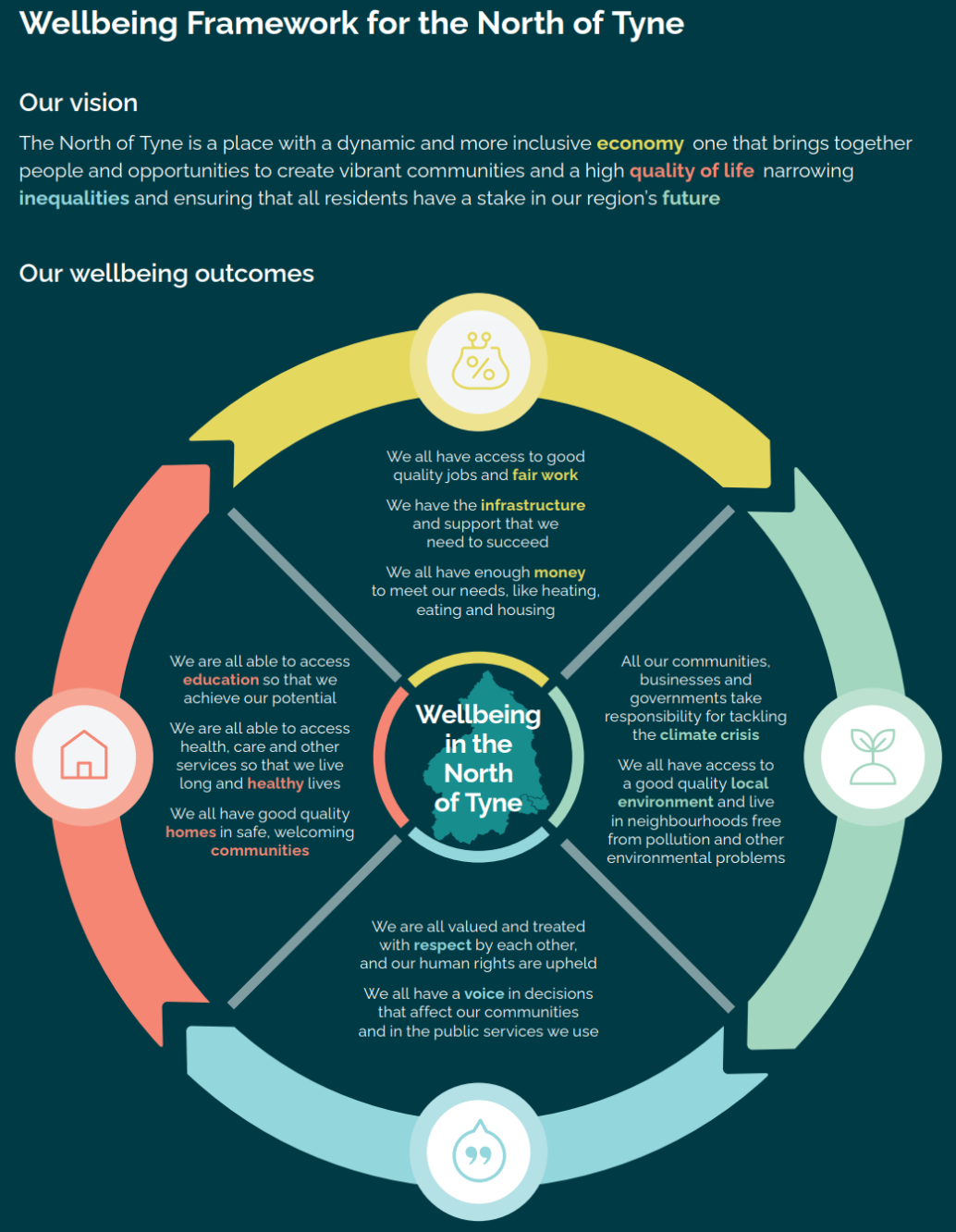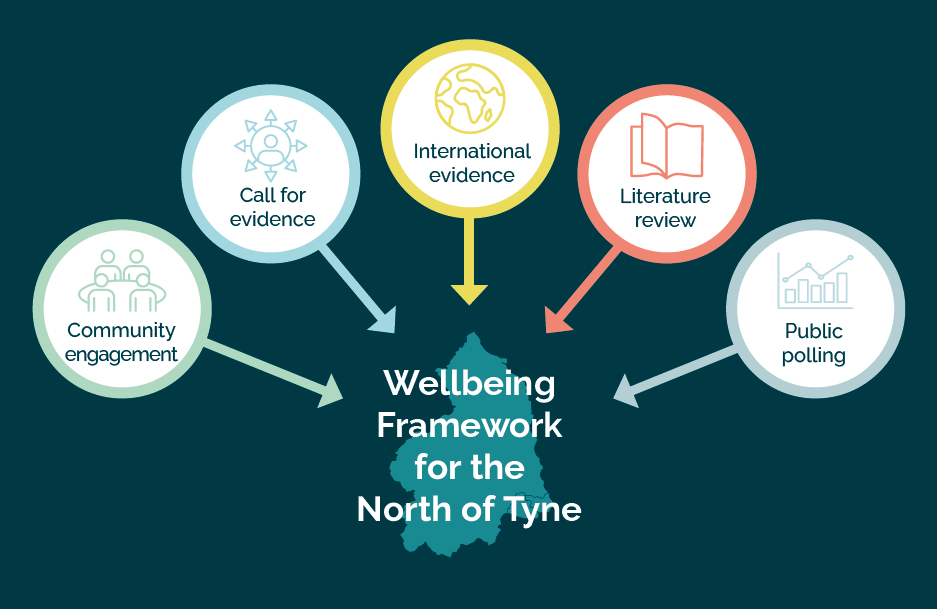Shaping Our Future: a Wellbeing Framework for the North of Tyne
Posted on 02 Mar 2022 Categories: Blog, Cross-posts, Local initiatives, The place we want, Wellbeing
by Sarah McMillan and Professor Mark Shucksmith OBE
Earlier this week (Tuesday 25th January), the North of Tyne Cabinet endorsed the recommendations of a report by the Roundtable on Wellbeing in the North of Tyne and, in doing so, committed to putting wellbeing at the heart of decision-making.
If that feels like exactly the sort of thing that any government should be doing, it is worth noting that North of Tyne is leading the way as the first combined authority in England to adopt a ‘wellbeing framework’. This is important, because a wellbeing framework provides decision-makers and their partners with a tool for understanding local wellbeing priorities and for tracking progress towards a shared vision. It promises to have a significant impact on improving the lives of everyone who lives in the North of Tyne.
The North of Tyne is a region that we are proud to call home, and so we were delighted to accept an invitation to co-chair the ‘Roundtable’ – that is, a group of specialists with experience from different sectors, tasked with exploring the possibilities for a wellbeing approach to pandemic recovery. Particularly we were inspired by North of Tyne’s vision of an inclusive economy, a ‘zero carbon, zero poverty’ future, and the possibility for delivering real change.
But what does a wellbeing approach mean? For the Roundtable, it meant delivering on the wellbeing priorities of local people, so that everyone has what they need to live well, now and in the future. Therefore, a key focus of the Roundtable’s work was on understanding what really matters to people living and working in the North of Tyne.
Between May and November 2020, we conducted a review of international research on wellbeing policy and practice; we asked local organisations, businesses and universities to submit written evidence on wellbeing priorities; we held a series of community conversations, run by local charities and community groups, asking residents what matters most to them; and we commissioned a YouGov poll that asked over 1,700 people questions about the North of Tyne they want for their future.
Across these activities we heard about the importance of family, friends, and community, and of access to public services and leisure. We heard too just how much people care about access to nature and the quality of their local environment.
“The street I live on, everyone stops to chat to each other. Everyone knows everyone. There’s a good community feel on the street.”
(North of Tyne resident)
Alongside this there was a strong sense about the importance of tackling inequality, of ensuring that everyone’s voice is heard by decision makers, and that all our communities can access the building blocks of a good life.
“It is terrible to see how many people are living in poverty in a region which has the potential to be affluent.”
(North of Tyne resident)
These findings highlighted the interconnectedness of social, economic, environmental and democratic factors that make up our collective wellbeing – what Carnegie UK have called the ‘SEED’ approach. They also revealed a shared belief among residents across the North of Tyne that wellbeing is something that must be shared: it can only be achieved when everyone has what they need to live well. This, in turn, has implications for policymaking that reduces inequality and targets support for people and communities whose wellbeing is most under threat.
With support from Carnegie UK and North of Tyne Combined Authority, the Roundtable gathered and considered all of this information, and used it to propose a set of 10 ‘wellbeing outcomes’ or goals for the region which reflect the people’s priorities. Tied to each outcome is a set of ‘indicators’ that will allow government officials and members of the public alike to track progress.

Together, the overarching vision, the outcomes that we want to achieve, and the indicators that will tell us whether we’re on track, form our Wellbeing Framework for the North of Tyne. You can find out more in the summary report or, for a more detailed analysis, in the full report that the Roundtable presented to Cabinet.
Now that the Cabinet has accepted the recommendations of the Roundtable, and formally adopted this Wellbeing Framework for the North of Tyne, there is the challenging task of implementation. However, with this framework in place, decision makers and their partners now have a tool to understand wellbeing in the round, and to maintain a clear focus on delivering the wellbeing outcomes identified by people living and working throughout the region.
Indeed, because the Wellbeing Framework has been built on the voices and experiences of people right across the North of Tyne, it belongs to all of us. It is crucial that this sense of ownership and involvement is felt by people living in the region. (If that’s you, we would love to hear what you think of the framework, how you will support it and what our first steps should be in building wellbeing together: get in touch with Rhiannon.Bearne@northoftyne-ca.gov.uk to tell us what you think).
Our hope, then, is that this will have a real impact in delivering a wellbeing recovery for the North of Tyne – one that everyone feels part of. But even more than this, we hope that the example that we have developed here can inspire other regions across the UK and help stimulate the shift towards a fairer, greener, more inclusive society.
Sarah McMillan (Co-Chair) is Assistant Director of Policy, Northumberland County Council and Professor Mark Shucksmith OBE (Co-Chair) is a Carnegie UK Trustee.
This article originally appeared on the Carnegie UK blog on 26th January 2022.
Posted on 02 Mar 2022 Categories: Blog, Cross-posts, Local initiatives, The place we want, Wellbeing

